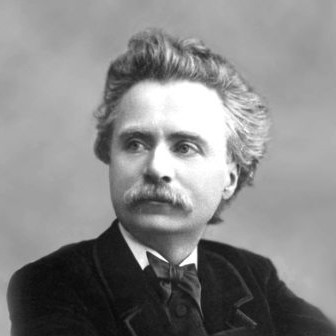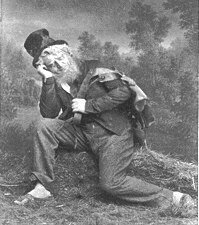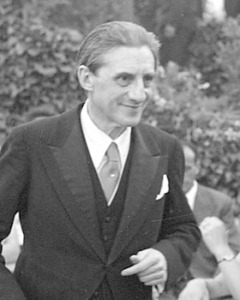REVIEW POTPOURRI: Sir John Barbirolli conducting the Halle Orchestra
 by Peter Cates
by Peter Cates
Grieg
Peer Gynt Suite No. 1; Symphonic Dances; Two Elegiac Melodies
Sir John Barbirolli conducting the Halle Orchestra; Mercury MG 50164, LP, recorded August 9, 1957.
Edvard Grieg (1843-1907) forged a musical style that was compounded of his life experiences amidst the beauties of the Norwegian landscape; health issues and one major loss; and the tunes and folk songs he heard and made part of his very soul. The fjords, mountains, lakes, meadows were distilled in the justly famed A Minor Piano Concerto, not on this record, and the three works that are contained here.
When he was 17 years old, in 1860, he came down with both pleurisy and tuberculosis but survived them, left in frail health for the remainder of his life. He married his first cousin, Nina Hagerup (1845-1935), in 1867, and they had a baby girl in 1868, only to lose her at one year old because of meningitis.
With respect to the music of Grieg’s formative years, as with such titans as Bach, Haydn, Beethoven, Brahms and Mahler, the bottom line is the quality of sheer genius they and select other composers brought to their own creations. The Peer Gynt 1st Suite has four numbers – the ever-majestic Morning, the haunting tragic Asa’s Death which is my favorite, the rhythmic mystery of Anitra’s Dance and the nasty savagery of In the Hall of the Mountain King. Its endless listenability through piles of different recordings since the early 1900s, every one at least good, has sustained a position among the 10 most well known classical standards.
His four Symphonic Dances are a vivacious series of what some have labeled “free fantasias;” the high spirits of countryside festivities – whether in Grieg’s Norway or the Bohemian world of Bedrich Smetana’s opera, The Bartered Bride, and Antonin Dvorak’s Slavonic Dances. The 2nd Dance has the solo oboe, and gently caressing harp and strings in one very well-sustained moment of lyricism that is unfortunately seldom heard.
Two Elegiac Melodies, for strings only, have the titles of Heart’s Wounds and The Last Spring, conveying the sadness and loss of irretrievable memories of happiness.
Sir John Barbirolli (1899-1970) lavished his complete soul on this music as he so often did with other composers. The Mercury record has the most vivid sense of immediacy to be heard on very few records from the 1950s. It too has been transferred to CD and streaming.
Responsible journalism is hard work!
It is also expensive!
If you enjoy reading The Town Line and the good news we bring you each week, would you consider a donation to help us continue the work we’re doing?
The Town Line is a 501(c)(3) nonprofit private foundation, and all donations are tax deductible under the Internal Revenue Service code.
To help, please visit our online donation page or mail a check payable to The Town Line, PO Box 89, South China, ME 04358. Your contribution is appreciated!





Leave a Reply
Want to join the discussion?Feel free to contribute!